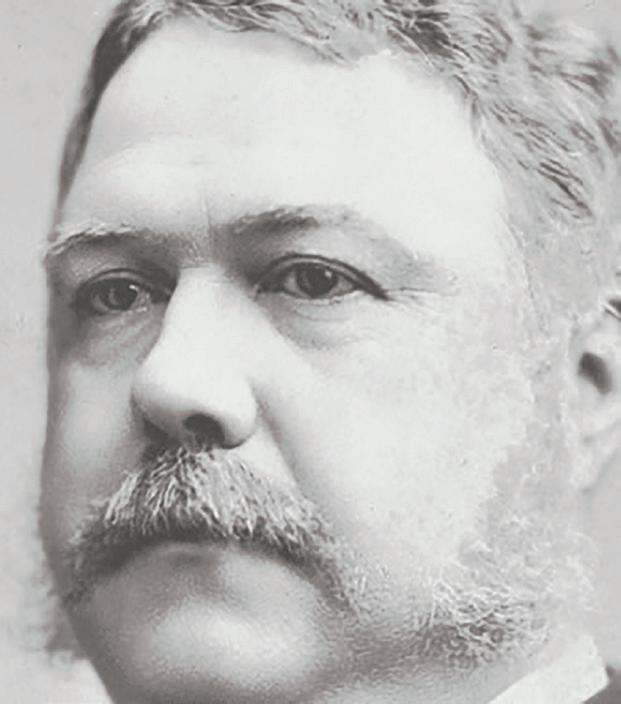
14 minute read
Chester A. Arthur
Born: Feb. 5, 1829 in Fairfield, Vt.
Term as president: September 20, 1881 – March 4, 1885
Party: Republican
Nicknamed the “Gentleman Boss,” Chester Arthur’s presidency is generally considered successful. He called for civil service reforms and responsible monetary policy. The crown jewel of the Arthur administration was the 1883 Pendleton Civil Service Reform Act. The landmark act, which was passed in response to a scandal in which politically appointed postal workers schemed to steal millions of dollars from the U.S. government, ensured that government positions would be filled based on a person’s merit rather than politics. In addition, Arthur vetoed the Chinese Exclusion Act, which banned Chinese people from immigrating to America for 20 years. Although Congress could not overturn the veto, a modified bill was ultimately passed that banned Chinese immigration for 10 years.
Born: March 18, 1837 in Caldwell, N.J.
Terms as president: March 4, 1885 – March 4, 1889 and March 4, 1893 – March 4, 1897
Party: National Democratic Party


Grover Cleveland 22 & 24

In 1892, Grover Cleveland defeated Benjamin Harrison in the popular election and became the first and only president to serve two non-consecutive terms as president (his two terms were separated by Benjamin Harrison’s presidency). Unfortunately for Cleveland, he entered his second term in a difficult position. The country was experiencing a money crisis brought about by a lowered gold reserve and questionable spending. Cleveland was unsuccessful in his attempt to thwart an impending depression and refused to interfere in business matters or rising unemployment.

Benjamin Harrison 23

Born: Aug. 20, 1833 in North Bend, Ohio
Term as president: March 4, 1889 – March 4, 1893

Party: Republican

During Benjamin Harrison’s presidency, Congress passed the Sherman Antitrust Act, which prohibited companies from engaging in monopolistic behaviors. In this way, customers could have choices between service providers, giving companies incentives to improve services and price competitively. Congress also passed the McKinley Tariff, which was designed to protect domestic industries from foreign companies by raising duties (taxes) on imports. During his presidency, Harrison repeatedly championed for civil rights for African-Americans and introduced legislation that would have provided federal funding to school regardless of the races such schools served. None of his measures, however, made it through Congress successfully.

William McKinley

Born: Jan. 29, 1843, in Niles, Ohio
Term as president: March 4, 1897 – September 14, 1901
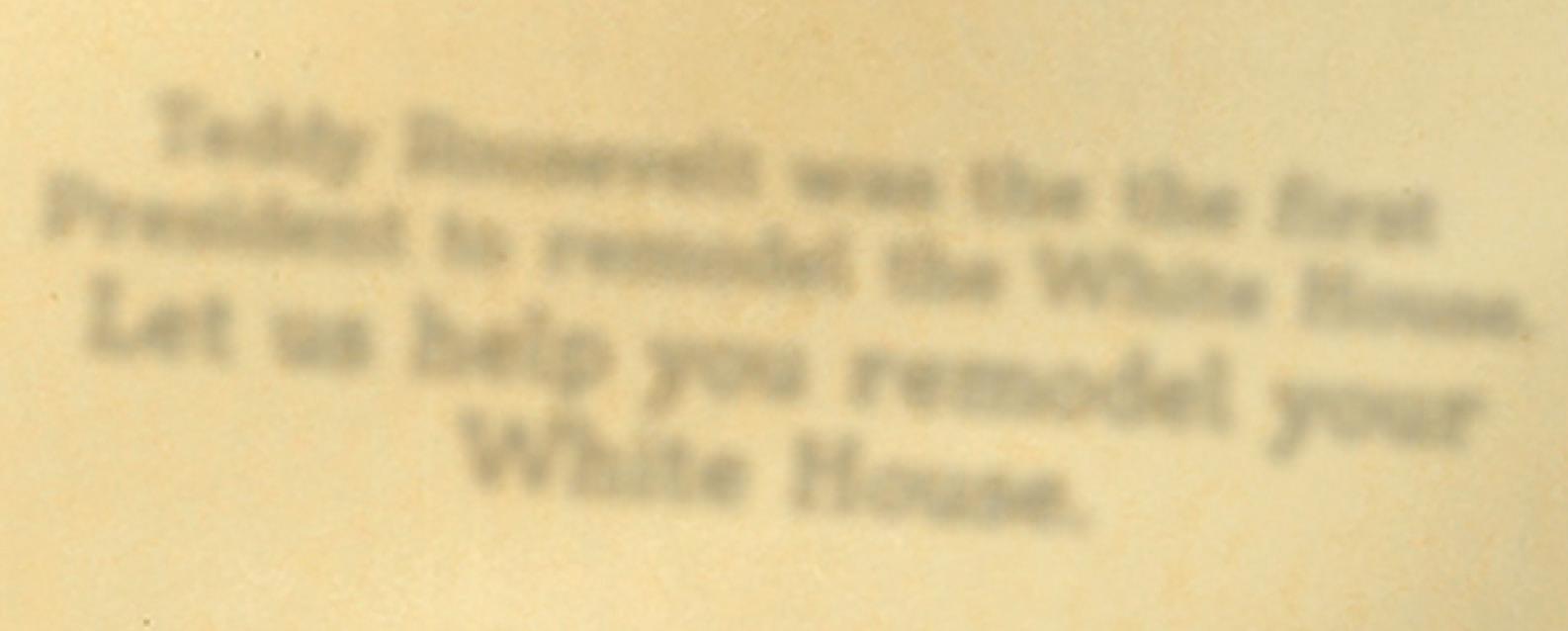



Party: Republican
William McKinley’s presidency was dominated by foreign relations, especially with Spain. The United States had interests in several Spanish colonies including Cuba and the Philippines. These colonies were thought to be in virtual rebellion thanks to sensationalized stories in the newspapers and publications of William Randolph Hearst. In 1898, the warship U.S.S. Maine was mysteriously sunk in Havana Harbor, killing 260 men. Congress declared war in what came to be known as the Spanish American War. In the treaty that followed, the United States gained ownership of the Philippines, Guam and Puerto Rico and temporary control over Cuba. On Sept. 5, 1901 as McKinley was attending the Pan-American Exposition in Buffalo, N.Y., he was shot by anarchist Leon Frank Czolgosz. McKinley’s wounds became gangrenous and he died Sept.14.
Theodore Roosevelt 26
Born: Oct. 27, 1858 in New York City
Term as president: September 14, 1901 – March 4, 1909
Party: Republican
Theodore Roosevelt served two eventful terms as president. In his first term, he supported a rebellion in Panama that cleared the way for that country’s independence from Colombia, as well as for the U.S. acquisition of land in Panama that would later be used for construction of the Panama Canal. He fought vigorously against corporate corruption, and pushed for the dissolution of the Northern Securities Company for violating the Sherman Antitrust Act. In 1905, President Roosevelt helped mediate a peace treaty between Russia and Japan for which he was awarded the Nobel Peace Prize. In 1906, Roosevelt signed the Hepburn Act, which awarded greater powers to the Interstate Commerce Commission and the Federal Food and Drug Act. Furthermore, Roosevelt started the U.S. Forest Service and signed the 1906 Antiquities Act under which he proclaimed 18 national monuments, five national parks, 51 wildlife refuges and 150 national forests. In 1908, the Bureau of Investigation was created to conduct investigations for the Justice Department.

William Howard Taft 27
Born: Sept. 15, 1857, in Cincinnati, Ohio Term as president: March 4, 1909 – March 4, 1913 Party: Republican William Taft’s presidency was highlighted by his strengthening of the Interstate Commerce Commission, expansion of the Civil Service and his establishment of a postal savings bank and parcel post system. He also supported the passage of the 16th Amendment allowing a federal income tax on corporations and the 17th amendment establishing direct election of senators by the people. He quickly lost the support of the business community by launching anti-trust lawsuits against 80 different companies, including U.S. Steel, one of the nation’s largest corporations, and
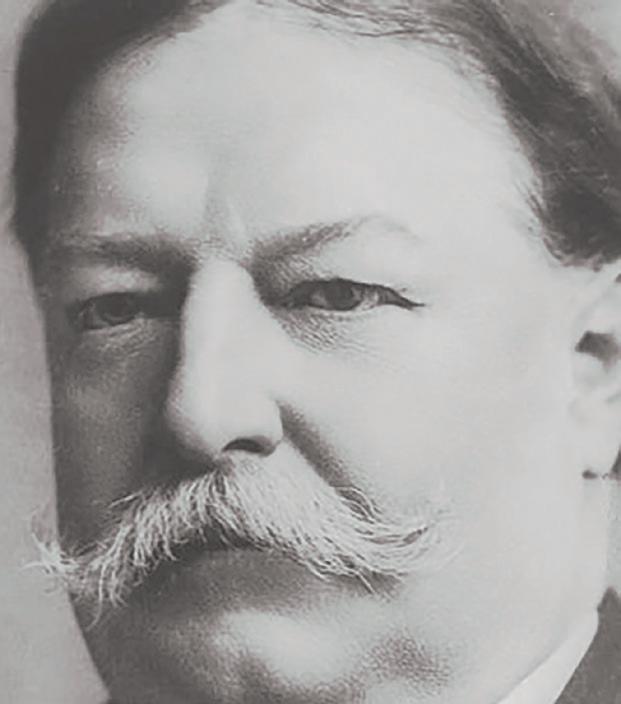
Woodrow Wilson
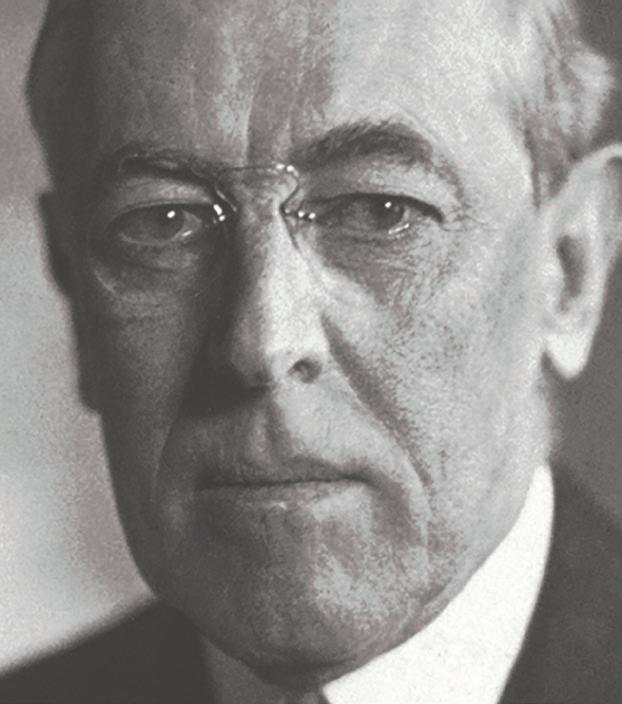
Born: Dec. 28, 1856, in Staunton, Va.
Term as president: March 4, 1913 – March 4, 1921
Party: Democratic
As president, Woodrow Wilson’s progressive politics led to the passage of numerous acts designed to check big businesses. Wilson’s second term was dominated by World War I. Over 2.8 million men and boys were drafted for military service. Wilson successfully guided the nation through the war. In 1918, Wilson issued his famous “Fourteen Points,” a statement and speech outlining his vision of a free world, successful foreign policy, democracy, trade equality, free navigation and solutions to territorial disputes in Europe. His speech ended with the promotion of the League of Nations, an organization of nations formed to promote world peace, disarmament and diplomacy. In 1919, Wilson was issued the Nobel Peace Prize for his work in promoting the League of Nations.
Warren G. Harding 29
Born: Nov. 2, 1865, in Blooming Grove, Ohio
Term as president: March 4, 1921 – August 2, 1923

Party: Republican
Upon his election, Warren Harding quickly appointed high-profile politicians to his cabinet including Andrew Mellon, Herbert Hoover and Charles Evans Hughes. He also surrounded himself with political allies from his home state known as “the Ohio Gang.” Harding’s presidency is often considered one of the most corrupt in history, although much of the corruption was uncovered after Harding died in office. The most infamous scandal being the Teapot Dome Scandal. Secretary of the Interior Albert Bacon Fall was bribed by a major oil company to lease federal petroleum reserves in Wyoming and California at low prices rather than to the highest bidder. Fall would become the first cabinet member of a United States president to be sent to prison. Attorney General Harry Daugherty was implicated in several corruption schemes, as were various others who were considered part of Harding’s inner circle.
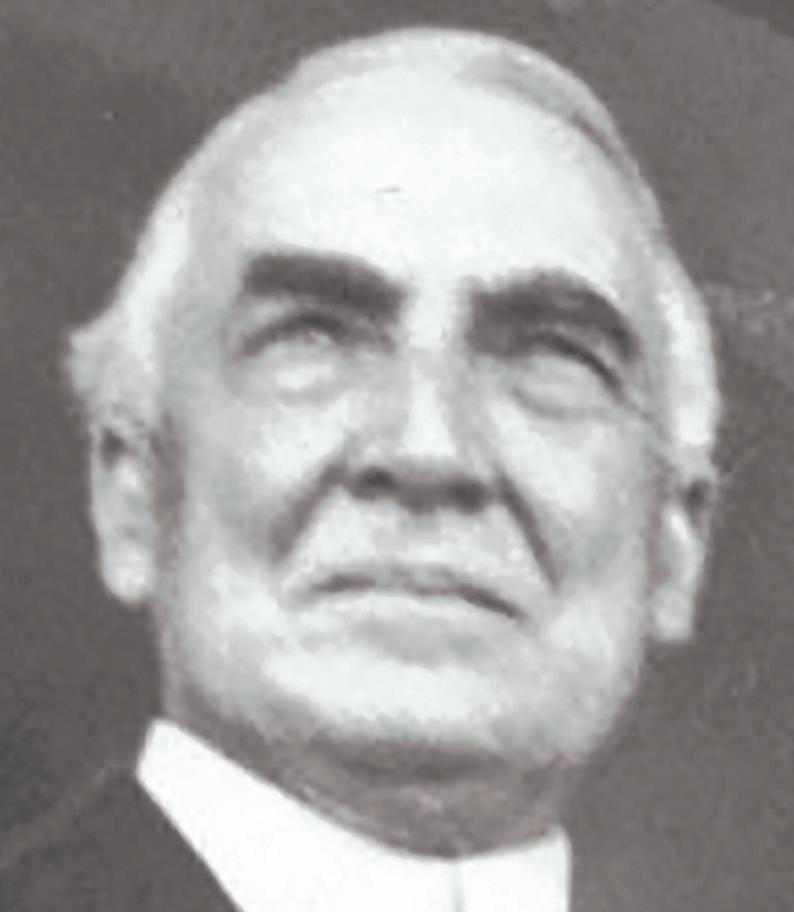
Calvin Coolidge
Born: July 4, 1872, in Plymouth Notch, Vt.
Term as president: August 2, 1923 – March 4, 1929

Party: Republican
As president, Calvin Coolidge was credited with restoring integrity to the White House and was given the nickname “Silent Cal” due to his dry sense of humor and his stoic demeanor. During his presidency he saw great economic prosperity. He was instrumental in the ratification of the 19th Amendment, which ensured women would be allowed to vote in all public elections. In 1924, the Republican Party decided to not choose Coolidge to run for re-election because he appeared worn out and exhausted after the death of his son. After he left office, Coolidge actually took some responsibility for the stock market crash and openly admitted he “avoided the big problems” and said he could have prevented the Great Depression had he been more hands-on.
Herbert Hoover
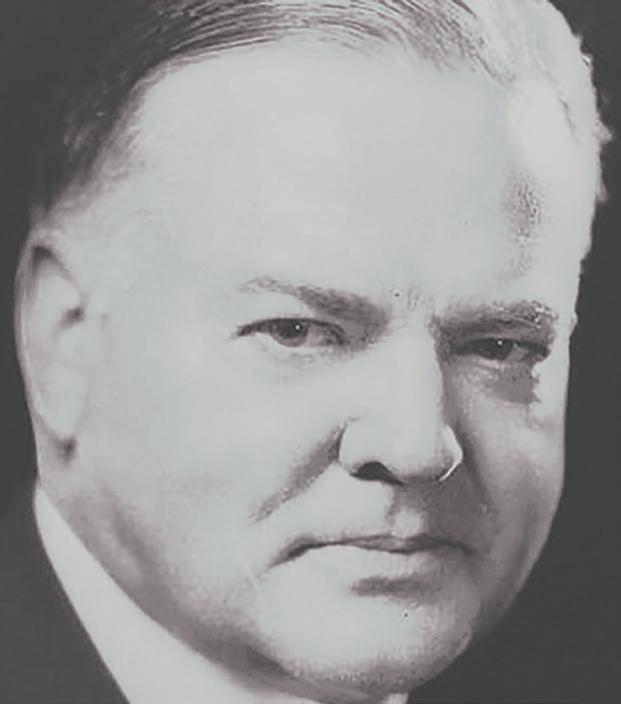
Born: July 4, 1872, in Plymouth Notch, Vt.
Term as president: March 4, 1929 – March 4, 1933
Party: Republican
Herbert Hoover will forever be tied to the Great Depression due to the Black Tuesday Stock Market Crash and unwillingness to use his political power to intervene and help the American people. Due to his conservative beliefs, Hoover believed the government should play a limited role in relief efforts and relied heavily on the idea of “rugged individualism,” or the belief that the people would get themselves out of the Great Depression. Many of Hoover’s plans did not work, and the people started referring to the ever-growing shanty towns as “Hooverville.”
Franklin D. Roosevelt 32
Born: Jan. 30, 1882, in Hyde Park, N.Y.
Term as president: March 4, 1933 – April 12, 1945
Party: Democratic
The year 1932 was a turbulent time in American history. The country was mired in the misery of its worst depression in history. President Franklin D. Roosevelt immediately implemented a sweeping plan known as the “New Deal” to bring recovery to agriculture and business, relief to the unemployed and to those in danger of losing businesses, farms or homes. He initiated Social Security reforms, raised taxes on the wealthy, implemented new controls over banks and public utilities, and started an enormous work relief program for the unemployed. When the Japanese attacked Pearl Harbor on Dec. 7, 1941, Roosevelt directed organization of the nation’s manpower and resources for global war.

Harry S. Truman
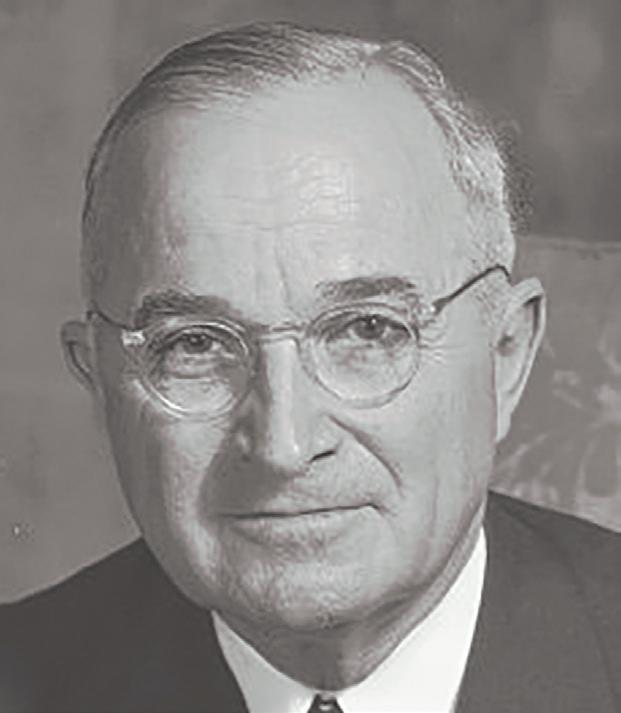
Born: May 8, 1884 in Lamar, Mo.
Term as president: April 12, 1945 – January 20, 1953

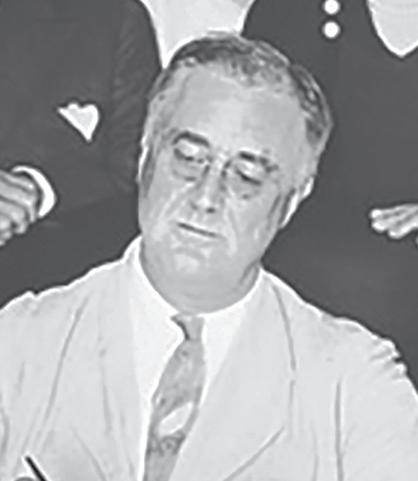
Party: Democratic
Harry Truman’s presidency began in the latter stages of World War II. Truman authorized the use of nuclear weapons against Japan to end the war. American military forces dropped two nuclear bombs on Aug. 6 and 9, 1945 over the cities of Hiroshima and Nagasaki, respectively, marking the first and only time nuclear weapons had ever been used in warfare. Truman was instrumental in the establishment of the North Atlantic Treaty Organization (NATO), which established alliances with Canada and much of western and northern Europe in opposition to the growing communist threat of the Soviet Union. Nevertheless, Truman’s popularity began to wane as the Soviet nuclear program rapidly developed amid allegations that Truman’s administration was harboring Soviet spies.
Dwight D. Eisenhower
Born: October 14, 1890, Abilene, Kan.
Term as president: January 20, 1953 – January 20, 1961
Party: Republican
Dwight D. Eisenhower was a commander during World War II and the 34th president of the United States. As president, he negotiated a peace treaty ending the Korean War. Eisenhower signed the Civil Rights Act of 1957 and sent Army troops to enforce federal court orders that integrated schools in Little Rock, Ark. He opposed Joseph McCarthy by openly invoking executive privilege. His largest program was the interstate highway system. He promoted the establishment of strong science education via the National Defense Education Act. In his farewell address to the nation, Eisenhower expressed his concerns about the dangers of massive military spending, particularly deficit spending and government contracts to private military manufacturers.
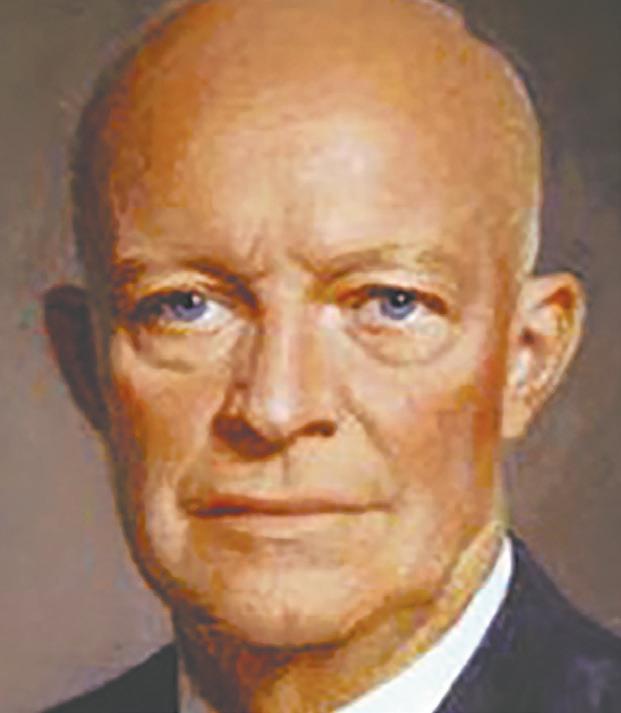
John F. Kennedy 35

Born: May 29, 1917 in Brookline, Mass.
Term as president: January 20, 1961 – November 22, 1963
Party: Democratic
In his inaugural address, John F. Kennedy stressed the importance of citizenship and uttered the famous quote, “Ask not what your country can do for you; ask what you can do for your country.” His presidency got off to a rough start in 1961 with the infamous failure of the Bay of Pigs invasion. In 1962, Kennedy faced what came to be known as the Cuban Missile Crisis. President Kennedy ordered a naval blockade of all ships bound for Cuba to prevent Russia from bringing nuclear missiles into the country. President Kennedy created Project Apollo, which paved the way for American space exploration. He also guided the nation through the difficult period of desegregation. On Nov. 22, 1963, in Dallas, Texas, President John F. Kennedy was shot and killed by Lee Harvey Oswald while riding in a motorcade. It was one of the most shocking news events in the history of the United States. Millions of people mourned.
Lyndon B. Johnson 36

Born: August 27, 1908, near Stonewall, Texas
Term as president: November 22, 1963 – January 20, 1969

Party: Democratic
When President Kennedy was assassinated, Lyndon B. Johnson was sworn in as America’s 36th president. Johnson successfully advocated a tax cut for the public and a new Civil Rights Bill. He also spoke to the populace of a “Great Society” in which the meaning of life and the marvels of man’s labor were one and the same. In 1964, Johnson was re-elected by the widest margin in American history. Johnson’s second term, however, was plagued by the escalating situation in Vietnam. Despite his popularity, Johnson decided not to run for a third term as president so he could devote all of his time to establishing peace.
Richard Nixon 37



Born: Jan. 9, 1913 Yorba Linda, Calif.
Term as president: November 22, 1963 – January 20, 1969 Party: Republican

Nixon’s most pressing concern while in office was the controversial Vietnam War. Nixon also established diplomatic relations with China, and created the Environmental Protection Agency. Ultimately Nixon will forever be tied to the infamous Watergate Scandal at the Watergate Hotel in Washington, D.C. Nixon used the CIA to block an FBI investigation. It was ultimately revealed that Nixon had secretly taped every conversation he had in the Oval Office. Nixon denied a congressional request to relinquish the tapes, citing his executive privilege. Eventually, the Supreme Court forced Nixon to deliver the tapes. Meanwhile the House of Representatives voted to impeach him. Facing certain impeachment by the Senate, Nixon resigned, making Vice President Gerald R. Ford president.
Gerald Ford 38

Born: July 14, 1913 in Omaha, Neb.
Term as president: August 9, 1974 – January 20, 1977
Party: Republican

Shortly after assuming the role of president, Gerald Ford pardoned Nixon for any crimes he may have committed, which meant he would never have to face criminal charges for the Watergate scandal. This move was a very controversial one as many Americans wanted to see Nixon brought to justice for his crimes. During his presidency, Ford faced high unemployment and inflation rates, which made him extremely unpopular among Republicans and Democrats alike. He attempted to boost his public standing by introducing a presidential clemency program for Vietnam War draft dodgers. In 1976, Ford attempted to run for re-election. Ford was able to secure the Republican nomination, but he was defeated by Jimmy Carter.
Jimmy Carter 39

Born: Oct. 1, 1924 in Plains, Ga.
Term as president: January 20, 1977 – January 20, 1981 Party: Democratic
Symbolizing his commitment to a new kind of leadership, after his inaugural address, Carter got out of his limousine to walk to the White House among his supporters. Carter’s main domestic priority involved energy policy. With oil prices rising, and in the aftermath of the 1973 oil embargo, Carter believed it was absolutely necessary to reduce America’s dependence on foreign oil. Carter received major criticism throughout his term for rising gas prices due to his war on foreign oil dependency. Carter’s foreign policy centered around a promise to make human rights a central concern in the United States’ relations with other countries. But Carter’s most notable foreign policy achievement was his successful mediation of the Camp David Accords between Israel and Egypt, leading to a historic peace treaty in which Israel withdrew from the Sinai Peninsula and the two sides officially recognized each other’s governments.
Ronald Reagan
Born: Feb. 6, 1911 in Tampico, Ill.
Term as president: January 20, 1981 – January 20, 1989
Party: Republican
In 1981, Reagan delivered one of the most passionate inaugural addresses in history as he told the American he would provide a beacon of hope for those who lacked hope. In March of the same year, Reagan survived an assassination attempt while exiting the Washington Hilton Hotel. In his first year Reagan’s administration passed sweeping tax cuts, based on supply-side economics, the idea that tax cuts would result in higher wages, increased consumer spending, and increased investment in the stock market. The plan was popularized in the media as “Reaganomics.” Conversely, Congress passed and Reagan signed into law tax increases of some nature in every year from 1981 to 1987 to continue funding government programs.

He also introduced the Reagan Doctrine, which declared the United States would aid countries in Africa and Latin America that were fighting against Communism. Reagan is given credit for ending the Cold War as he was able to forge a diplomatic relationship with the Soviet Union.
George H.W. Bush 41
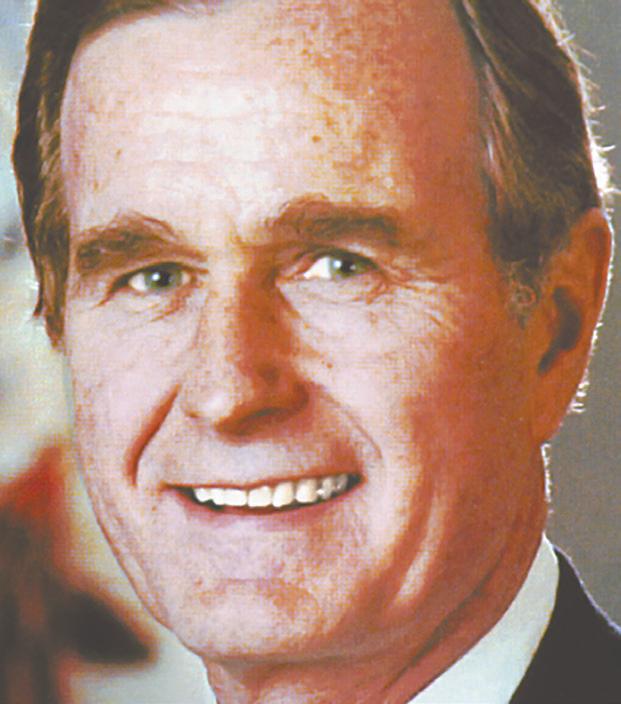
Born: June 12, 1924 in Milton, Mass.
Term as president: January 20, 1989 – January 20, 1993
Party: Republican
George H.W. Bush’s presidency came at a time of major political upheaval abroad as the Soviet Union and Berlin Wall fell. In January 1991, he authorized the Persian Gulf War after Iraq invaded its neighbor to the south, Kuwait. Despite a lack of international support for the military measures, the attack made him very popular in the United States. In 1991, Bush met with Mikhail Gorbachev, leader of the Soviet Union, and signed an arms reduction treaty which reduced each country’s supply of nuclear arms by 35% and the Soviet Union’s land-based intercontinental ballistic missiles by 50%. This treaty was viewed as a breakthrough in relations between the United States and the Soviet Union. Bush also spearheaded the effort for the North American Free Trade Agreement (NAFTA).
Bill Clinton

Born: Aug. 19, 1946 in Hope, Ark.
Term as president: January 20, 1993 – January 20, 2001

Party: Democratic
In his first term, William “Bill” Clinton struggled to make his mark. He was able to get the Violent Crime Control and Law Enforcement Act passed, but he was unable to get his Health Care Reform Act passed that would have provided universal health coverage. Clinton’s reputation suffered from scandal in his personal life. His second term in the White House was dominated by details of infidelity while president, prompting a congressional investigation and near 24-hour news coverage. In 1998, the Republican-dominated House of Representatives impeached Clinton for perjury and obstruction of justice for his actions. The Senate acquitted him of all charges in 1999.
George W. Bush
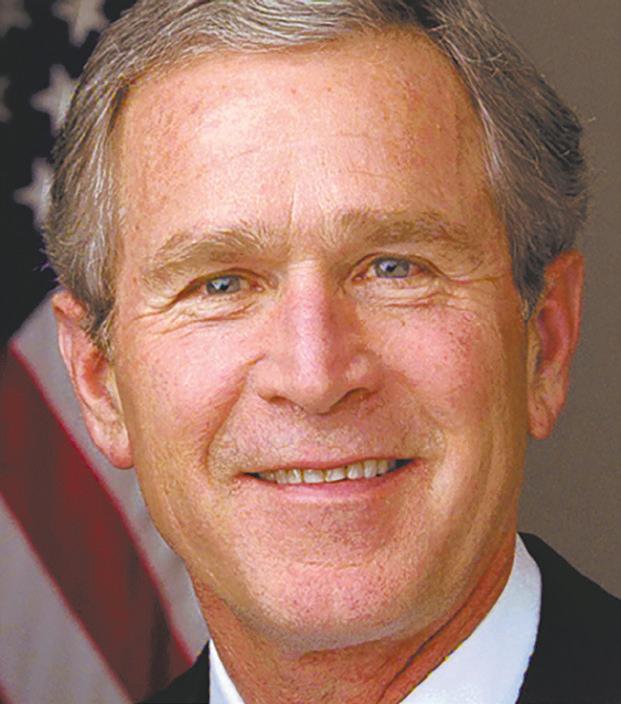
Born: July 6, 1946 in New Haven, Conn.
Term as president: January 20, 2001 – January 20, 2009

Party: Republican
The 2000 presidential election of George W. Bush would be one of the most highly contested elections in history with the U.S. Supreme Court deciding the results. On Sept. 11, 2001 four hijacked U.S. airplanes struck the World Trade Center in New York City, the Pentagon outside of Washington, D.C., and a field in western Pennsylvania. The passage of the Patriot Act and the establishment of the Department of Homeland Security followed. In September 2002, the Bush administration announced the United States would use military force if necessary to prevent threats to its national security by terrorists or “rogue states.” On Oct. 7, 2001 Bush ordered the invasion of Afghanistan and on March 20, 2003 the United States launched an invasion of Iraq. Baghdad, the Iraqi capital, fell on April 9, 2003 and Bush declared an end to major combat operations on May 1, 2003. A majority of combat troops would not be withdrawn from Iraq until December 2011 and December 2016 in Afghanistan.
Barack Obama 44
Born: Aug. 4, 1961 in Honolulu, Hawaii
Term as president: January 20, 2009 – January 20, 2017

Party: Democratic
Barack Obama’s presidency started in economic turmoil with 2.6 million jobs lost in the first year of his presidency. An economic stimulus of $787 billion passed in 2009 aimed at helping the economy recover. The Obama administration intervened in the troubled automotive industry renewing loans for GM and Chrysler to continue operating. Obama is probably best known for the Affordable Care Act, which became known for better or worse as “Obama Care.” The Affordable Care Act faced several legal challenges with the Supreme Court upholding the individual mandate in a 5-4 decision.
Donald Trump
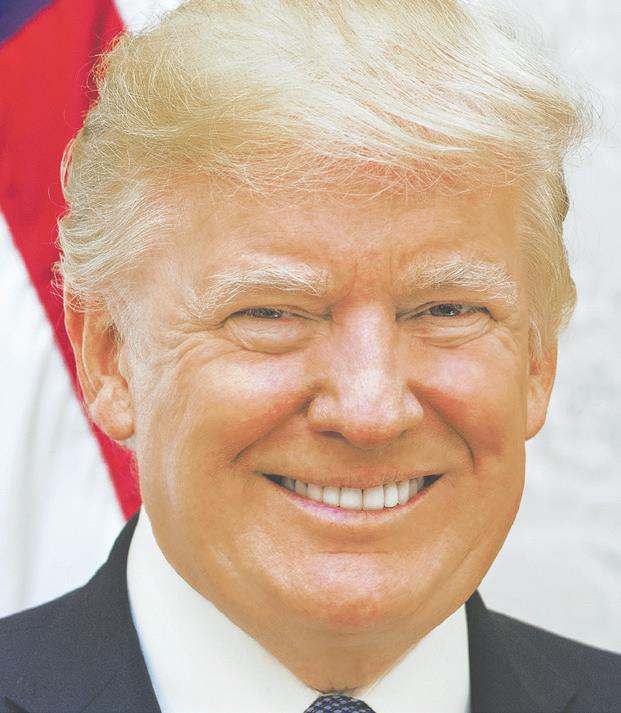
Born: June 14, 1946 in New York City Term as president: January 20, 2017 – Present Party: Republican
In his first year in office Donald Trump reversed many of the previous administration’s policies, often by executive order. He appointed two Supreme Court Justices — Neil Gorsuch and Brett Kavanaugh — ordered a controversial travel ban on citizens from several Muslim-majority countries and signed tax reform legislation. Trump has changed course on foreign policy by withdrawing from the Paris Climate Agreement and the Trans-Pacific Partnership, installed tariffs against rivals and allies, including China and Canada, pressured North Korea over the acceleration of their nuclear missile program, and recognized Jerusalem as the capital of Israel. On Dec. 18, 2019 the House approved articles of impeachment against Donald Trump for abuse of power and obstruction of Congress, making him the third president in history to be charged with committing high crimes and misdemeanors and face removal by the Senate. However, on February 5, 2020 the Senate voted to acquit President Trump.




